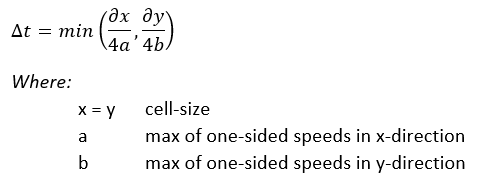Timestep formula (Water Overlay)
An adaptive timestep is implemented according to Kurganov and Petrova (2007)[1]. At every timestep, the courant-number is kept smaller than 0.25 for every active computation cell.
Especially at low depths, choosing the appropriate timestep is critical to avoid numerical instability. Therefore the following principles are used to determine the right time step:
- the timestep is choosen so that all computation cells follow one of the following criteria.
- if a cells waterdepth is below the flooding threshold, 5 * 10-3 (m) there is no flow assumed between that cell and it neigboring cell.
- if the cells waterdepth is above above the flooding threshold, the maximum timestep is assumed to be 100 * the waterdepth at the cell.
- if the waterdepth increases, the timestep is assumed to be not larger than the formula above.
If the numerical flux decreases, larger timesteps are allowed than set by Kurganov and Petrova[1], depending on the configured calculation.
References
- ↑ 1.0 1.1 Kurganov A, Petrova G (2007) ∙ A Second-Order Well-Balanced Positivity Preserving Central-Upwind Scheme for the Saint-Venant System ∙ p 15 ∙ found at: http://www.math.tamu.edu/~gpetrova/KPSV.pdf (last visited 2018-06-29)





